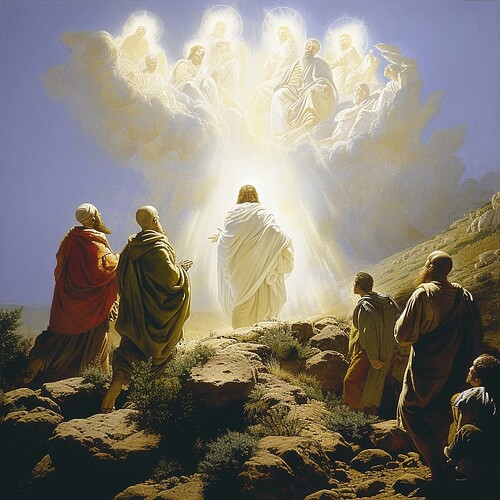 February 13: Mark 9 - Steps to True Greatness
February 13: Mark 9 - Steps to True Greatness
Bridging The Natural And The Supernatural
 Introduction
Introduction
In Mark 9, we see Jesus’ transfiguration, a momentous event that further confirms His divine identity. Following this, He teaches on true greatness, driving out demons, and cautions against causing others to stumble.
 The Transfiguration
The Transfiguration
Jesus’ transfiguration signified a divine affirmation of Jesus’ mission. Peter, James, and John witnessed the glory of Christ firsthand and heard God’s voice confirming Jesus as His beloved Son.
Key Verse: Mark 9:7 “This is My beloved Son, listen to Him!”
 Teaching on True Greatness
Teaching on True Greatness
Jesus overturns worldly ideas about power and prestige by stating that greatness in His kingdom comes from being like a little child - humble, trusting, and receptive.
Key Verse: Mark 9:35 “If anyone wants to be first, he shall be last of all and the servant of all.”
 Key Themes and Reflections
Key Themes and Reflections
1. The Supernatural in the Natural:
The transfiguration displays God’s glory breaking into the everyday, reminding us that spiritual realities permeate our natural world.
2. Humility and Service:
Contrary to popular belief, greatness in the Kingdom of God isn’t about power or influence but about humility and selfless service.
 Today’s Application
Today’s Application
In our pursuit of success, we can seek to model the humility and servitude that Jesus taught as the path to true greatness.
 Hidden Gem
Hidden Gem
Did you know that Moses and Elijah appeared during the Transfiguration? These figures represent the Law and the Prophets, both affirming Jesus as the fulfillment of Old Testament prophecy.
 Reflective Q&A
Reflective Q&A
 Why is the transfiguration event significant?
Why is the transfiguration event significant?
A: It highlights the unity of the Old and New Testaments, and affirms Jesus as God’s Son, fulfilling Messianic prophecies.
 What does Jesus’ teaching on true greatness mean to you?
What does Jesus’ teaching on true greatness mean to you?
A: This speaks to the importance of servant leadership and values humility over personal ambition.
 How does this chapter impact your view of greatness?
How does this chapter impact your view of greatness?
A: It prompts a re-evaluation of how we measure success and invites us to adopt a Christlike attitude in our interactions.
 Join the Discussion
Join the Discussion
How have these insights from Mark 9 influenced your understanding about success and greatness? We invite you to share your thoughts with the community.
 See You Tomorrow in Mark 10!
See You Tomorrow in Mark 10!
Prepare to delve into Jesus’ teachings on marriage and divorce, His interaction with a rich young man, and more about the road to true greatness.
Remember, greatness in the Kingdom of God isn’t about our accomplishments, but about our attitudes and actions towards others. Let’s strive to be humble servants, following Christ’s footsteps towards true greatness.
